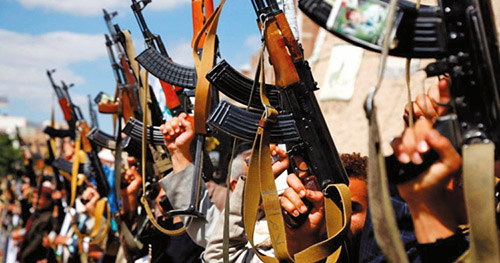
In response to the U.S. State Department’s terrorist designation reversal, the rebels escalated attacks on civilian targets in Saudi Arabia.
The Biden administration warned Yemen’s Houthi rebels on Feb. 7 to halt terrorist attacks targeting civilians just 48 hours after revoking the terrorist designation for this Iran-supported group. A U.S. State Department spokesperson announced that the Biden administration was “deeply concerned by continued Houthi attacks” and encouraged the rebel group to “immediately cease attacks impacting civilian areas inside Saudi Arabia.”
In mid-January, outgoing Secretary of State Mike Pompeo first announced the Trump administration’s decision to designate the Houthis as a Foreign Terrorist Organization, or FTO. Pompeo pointed to the rebel group’s cross-border attacks and persistent threats against civilian populations, among other guerilla behavior, to justify this announcement.
The State Department’s reversal of the Trump administration’s designation also came three days after President Joe Biden ordered the United States to pull its support for Saudi-led military operations and cancel “relevant arms sales.” Critics of the Trump administration’s Saudi Arabia policy warned that labeling the Houthis would only exacerbate the conflict and lead to a greater humanitarian crisis. However, two days into this policy’s reversal, the Houthis increased attacks against civilian targets in Saudi Arabia.
On Feb. 8, two days after Biden revoked the Houthi terror designation, the Saudi-led coalition announced that it intercepted and destroyed four armed drones, accusing the Houthi rebels of intentionally targeting civilians in a terrorist attack. Although the Houthis did not immediately claim responsibility for this, the rebel group has taken credit for previous drone and missile attacks in Saudi Arabia. For instance, in December, 22 people were killed and dozens injured in a terror attack targeting the airport in the Yemeni city of Aden. A year prior, Houthi rebels fired rockets on a military parade in Yemen, killing more than a dozen civilians.
The Houthi’s recent drone attacks are significant since they occurred within hours of Biden’s terror-designation reversal. Additionally, the U.N. special envoy on Yemen visited Iran the day before the drone attacks to discuss the Yemen crisis with Iranian Foreign Minister Javad Zarif. Iranian officials welcomed the Biden administrations’ shifted Saudi Arabia policy and said it was a “step toward correcting past mistakes.” Both the Obama and Trump administrations have supported the Saudi-led offensive in Yemen through intelligence-sharing, weapons sales and logistical aid.
Yemen’s civil war began in 2014, when the Houthi rebels took control of the capital, Sanaa, and attempted to seize the rest of the country. By 2015, Saudi Arabia and the United Arab Emirates entered the conflict to support the internationally recognized government of Yemen with the support of the United States, the United Kingdom and France. At the same time, Houthi leaders traveled to Iran to formalize cooperation going forward and to establish air service between the two capitals. Since then, Iranian weapons and personnel have flowed into Yemen, arming the Houthis to the teeth with weapons ranging from ballistic missiles to ammunition and sniper rifles.
The ongoing civil war has led to a devastating humanitarian crisis. According to the U.N. Office for the Coordination of Humanitarian Affairs, some 233,000 people have died in Yemen, including more than 13,000 civilians killed in targeted attacks. It is understandable that the Biden administration is seeking a peaceful resolution to this devastating conflict. However, Iran has shown that they will take advantage of perceived American concessions. The Houthi rebels are less likely to negotiate now that the Biden administration already promised to end U.S. support for Saudi-led operations in Yemen.
Maya Carlin is an analyst at the Center for Security Policy in Washington, D.C. She is also an M.A. candidate in Counter-Terrorism and Homeland Security at IDC Herzliya’s Lauder School of Government in Israel.
By Maya Carlin/JNS.org









